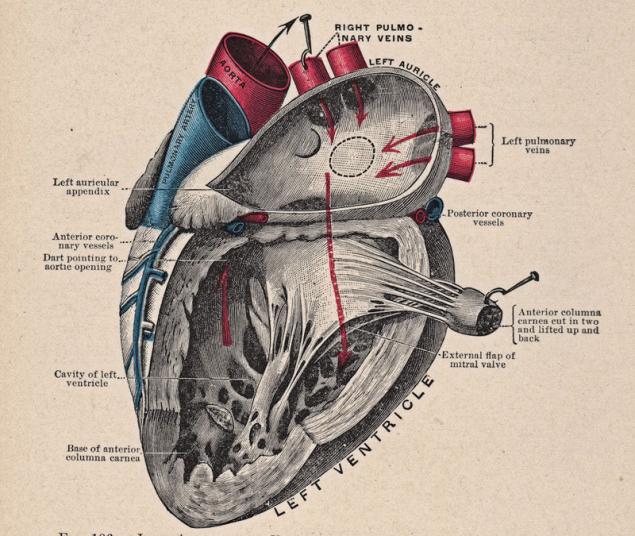20 little-known facts about the human body
 Bashny.Net
Bashny.Net
The human body still continues to reveal its mysteries. Studying the operation of its systems, every year scientists make hundreds of discoveries. And often new facts refute established centuries presentation. 20. The silence of the heart

Heart normal adult human beats 72 times a minute, 100 thousand times a day, 36 million times a year and 2.5 billion times in a lifetime.
However, the heart beats rhythmically, so, in addition to strokes in the cycle there is a pause. So, if you add up all the pauses between the contractions of the heart per average human life, we find that our heart is "silent" for about 20 years. It is also interesting that the heart stops when sneezing .
19. Contrary to the laws of physics it is Known that the fluid can flow from greater pressure to lesser, but in our body, this law is constantly violated. When simultaneously measuring the pressure in the aorta and femoral artery, blood from the aorta, where a lower pressure, flows into the femoral artery, where the pressure is higher.
18. Round heart Recently, NASA conducted a study, which gave very interesting results. It turned out that in weightlessness the heart is not only weakened and reduced in volume, but... is rounded. During the experiment, cardiologists NASA studied the hearts of 12 astronauts working on the ISS.
Analysis of images showed that in weightlessness the heart is rounded off by 9.4 %. However, when returning to Earth heart for six months to regain its normal shape and resumes its worldly activity. To represent the decrease in the activity of the heart, suffice it to say that six weeks of lying on the bed equivalent of a week's work in zero gravity.
17. New skin: from three days to one month
Human skin is constantly updated. This process is called regeneration. There is this: new skin cells are formed in germinal layer of the epidermis for about 28-30 days they move to the surface and thus lose the cell nucleus. On the surface they are using they contain keratin form the stratum corneum of the skin, which is gradually flaking off when washing or in contact with clothing.
Thus, the skin, which we feel will be constantly updated.After a month the composition of the skin changes completely.
In newborns, the process of regeneration, like many other processes (e.g., metabolism) is faster. "Change skin" of infants takes place over three days — 72 hours.
16. Internal "brewery" people with a "hanging gut" or so-called syndrome of "domestic brewery" turn inside any food and drinks alcohol. So they always a little tipsy. The cause of the illness is the inability of the stomach to break down sugar and carbohydrates — instead, he engaged in fermentation.
In addition, the body of the person with hanging intestines are not able to process the ethanol, resulting from the consumption of starch products. Such people, only one bottle of beer to gain of 0.37 ppm. Fortunately, this is a very rare syndrome in the world today was only 11 cases.
15. No hair fracture of the spine can lead to such unexpected consequences as the disappearance of body hair. This is a unique phenomenon, which scientists still are not very well understood. The hair on the human body are actively growing when you do a query in the brain and get feedback. If this link is broken – and that is exactly what happens if the spinal cord be seriously damaged, hair on the body gradually begin to disappear.
14. Bird genetics that "Skylark" "Skylark" — is not to his credit. As that "owl" "owl" — no guilt. So we "sharpened" nature. And who is responsible for chronotype defined American researchers Medical center of northwestern University of Chicago in collaboration with scientists of the Korean Institute of science and technology. By studying fruit flies Drosophilia melanogaster, they discovered a gene that regulates circadian rhythm. Called "gene 24 hours" and in 2010, published data in the journal "Science", where he noted that flies, which he "did not work, did not show activity with the onset of dawn."
If we draw a parallel with a man, then these fruit flies – a typical "owl", which is also unbearable to tear off the head from their "mushinyh cushions". And this same gene is responsible for light awakening those lucky enough to be born "larks".
13. Movable facial expressionsIn 2011, scientists were able to discover the facial expressions of the person occurs long before his birth. During the antenatal period, the child is able to move facial muscles, smile, surprise to raise the eyebrows or frown. Facial muscles constitute 25% of the total number of muscles while smiling involved 17 groups of muscles during anger or crying — 43. One of the best ways to maintain smooth skin on my face — kissing. When they work from 29 to 34 muscle groups.
12. Blood type as a factor in career and personal life In Japan with the 1930-ies practiced the doctrine of "ketsu-EKI-Gata", which is to tell all, knowing only his blood. The Japanese believe that the owners of the I blood group – a sociable and energetic people, the owners of the II blood group –stress resistant and patient, but stubborn. Creative and powerful people are usually the III blood group. People with rare IV group balanced and natural leaders.
"Ketsu-EKI-Gata" is incredibly popular. Japanese girl can ask on a first date is not about who you sign and what you blood. The Japanese are guided by blood and then when they get married and when getting a job. HR departments are trying to form perfectly matching "blood" teams.
11. Testosterone and longevity Effect of testosterone on lifespan not just found their confirmation in various studies. One of them, conducted in 1969 among patients of psychiatric hospital in Kansas, showed that castrated men live 14 years longer. Interesting data on this subject was recently published by Korean scientists, Kyung-Jin min. He studied the book "Yang-Se-Ke-Bo," in which it is possible to trace genealogical information is about 385 families, court eunuchs.
Comparing the lifespan of 81 eunuchs with confirmed dates of life, Kyung-Jin Min saw that the average lifespan of eunuchs was 71 years. That is, of his contemporaries eunuchs experienced an average of 17 years.
10. Craving to sleep Narcolepsy — a disease in which a person is constantly sleepy. Also known as paroxysms of irresistible sleepiness and disease Gelineau. The disease is uncommon, approximately 20-40 out of 100,000 people. Scientists have linked narcolepsy syndrome of disintegration, untimely early phases of sleep.
Patients suffering from narcolepsy, though and sleep a lot, but don't get enough sleep, because skipping the slow-wave sleep, are in REM sleep, the curve of which resembles the curve EEG EEG of awake person to sleep in this mode almost impossible. We sleep in the deeper stages of Delta sleep, patients with narcolepsy in this phase do not fall.
The causes of narcolepsy are to this day unclear. Some doctors believe the culprit of the disease - the brain neurotransmitter hypocretin. He regulates REM sleep and wakefulness. If the cells of this neurotransmitter damaged, this causes sleep disorders.
9. Natural alarm clock
Probably each of us ever woke up a few minutes before the alarm, especially when I knew in advance that just need to Wake up.
It is a merit of the so-called "natural alarm clock", namely, adrenocorticotropic hormone.
Scientists believe that it has something to do with minimizing stress to the body during a revival. But what is most interesting, we can consciously control. In the study of the properties of adrenocorticotropic hormone, an experiment was conducted in which a number of subjects pre-programmed yourself to awakening at a certain time. More than 75% of subjects alone really woke up when they need to.
8. The wave of death in 2009 In one of the American hospitals were removed from the MRI nine people dying, which at that time was not saved. The results were sensational – after the death in all subjects of the brain, which was supposed to be crucified, it literally exploded – it was an incredibly powerful bursts of electrical pulses, which are never observed in a living person. They came in two or three minutes after the heart stops and lasted about three minutes. Prior to this, similar experiments were conducted on rats in which the same was started a minute later after the death and lasted 10 seconds.
A similar phenomenon scientists have dubbed "wave of death". The scientific explanation for the "wave of death" has spawned a host of ethical issues.
According to one of the experimenters, Dr. Chawla Lakhmir, like bursts of brain activity are explained by the fact that from lack of oxygen, the neurons lose their electrical potential and are discharged, emitting pulses of the "avalanche". Live neurons are constantly under a slight negative voltage of – 70 minivault, which is fixed, by getting rid of positive ions that remain outside. After death the balance is disturbed, and the neurons were rapidly changing the polarity from "minus" to "plus".
7. As I hear men and women Women are better distinguish high frequency sounds. Weekly girl can already distinguish the sound of mother's voice and hears when the baby cries another. The boys is not necessary.
Women are better than men recognize changes in tone and therefore know when men lie.
Men spetsializiruyutsya on the call of the wild (skill is not so necessary in the city) and perfectly "hear" direction. If the first mewling of a kitten will hear a woman, then the man will indicate where to look.
6. This different sensitivity of the Skin of a woman 10 times more sensitive than the skin of men. Studies of British scientists showed that even the most sensitive in this sense man is not up to the most insensitive women. But men's skin is thicker than women's and therefore men have fewer wrinkles. On the back of an adult male skin is four times thicker than the abdomen. But if a man engaged in business, the sensitivity of the skin drops even more, and he almost feels no pain.
5. Electricity in us people Have great prospects as electricity generators, it is possible to generate from almost any of our actions. So, from one breath to get 1 W, and a relaxed step will be enough to power a light bulb 60 watts, and to charge the phone will be enough.
4. Light — "oven" of the body
One of the leading figures of the Soviet system hardening was a Soviet scientist of Austrian origin Karl Trincher. He spent five years in the Gulag, and the cold knew firsthand. Tricher once said that in laboratory animals with a deficiency of oxygen increases the temperature in the lungs. Here he made a brilliant conclusion: "Light is the only body where the fats react with oxygen, are burned directly. Without enzymes".
Today, and physiologists do not deny the fact that the lungs are the "stove", can warm the body cold. Or rather, not warm, but keep warm, to resist the dominant pathogenic cold. Therefore, the frost must first follow the breath, to breathe slowly, evenly and deeply.
3. The perception of the sexes On the retina of the human eye are nearly seven million receptors"cones", which are responsible for color perception. For their action meets the X chromosome. Women have two of them, and the palette of colors that they perceive wider. In conversation, they operate the shades: "aquamarine", "sand", "light coffee". Men talk about fundamental colors: red, white, and blue.
2. Great skin
The skin is the largest organ of the human body. The average area of its surface is 1.5 to 2 square meters. In different parts of the body the skin has a different thickness and sensitivity. The thickest skin on the soles and palms, thinnest on the eyelids. The sensitivity of the skin is not in direct proportion to the thickness. So, on the fingers and palms although the skin is rather thick, can feel pressure from 20 milligrams, which corresponds to the average weight of flies.
1. Heart-laborer In our body every second are-extremely high-speed processes. When the body is at rest, the path of blood from the heart to the lungs and back takes only six seconds from the heart to the brain and back in eight seconds, sixteen seconds, it takes its way from heart to fingertips and back. published
Author: Alex Mirsky P. S. And remember, only by changing their consumption — together we change the world! ©
Source: russian7.ru/2015/06/20-maloizvestnykh-faktov-ob-organizme-che/

Heart normal adult human beats 72 times a minute, 100 thousand times a day, 36 million times a year and 2.5 billion times in a lifetime.
However, the heart beats rhythmically, so, in addition to strokes in the cycle there is a pause. So, if you add up all the pauses between the contractions of the heart per average human life, we find that our heart is "silent" for about 20 years. It is also interesting that the heart stops when sneezing .
19. Contrary to the laws of physics it is Known that the fluid can flow from greater pressure to lesser, but in our body, this law is constantly violated. When simultaneously measuring the pressure in the aorta and femoral artery, blood from the aorta, where a lower pressure, flows into the femoral artery, where the pressure is higher.
18. Round heart Recently, NASA conducted a study, which gave very interesting results. It turned out that in weightlessness the heart is not only weakened and reduced in volume, but... is rounded. During the experiment, cardiologists NASA studied the hearts of 12 astronauts working on the ISS.
Analysis of images showed that in weightlessness the heart is rounded off by 9.4 %. However, when returning to Earth heart for six months to regain its normal shape and resumes its worldly activity. To represent the decrease in the activity of the heart, suffice it to say that six weeks of lying on the bed equivalent of a week's work in zero gravity.
17. New skin: from three days to one month
Human skin is constantly updated. This process is called regeneration. There is this: new skin cells are formed in germinal layer of the epidermis for about 28-30 days they move to the surface and thus lose the cell nucleus. On the surface they are using they contain keratin form the stratum corneum of the skin, which is gradually flaking off when washing or in contact with clothing.
Thus, the skin, which we feel will be constantly updated.After a month the composition of the skin changes completely.
In newborns, the process of regeneration, like many other processes (e.g., metabolism) is faster. "Change skin" of infants takes place over three days — 72 hours.
16. Internal "brewery" people with a "hanging gut" or so-called syndrome of "domestic brewery" turn inside any food and drinks alcohol. So they always a little tipsy. The cause of the illness is the inability of the stomach to break down sugar and carbohydrates — instead, he engaged in fermentation.
In addition, the body of the person with hanging intestines are not able to process the ethanol, resulting from the consumption of starch products. Such people, only one bottle of beer to gain of 0.37 ppm. Fortunately, this is a very rare syndrome in the world today was only 11 cases.
15. No hair fracture of the spine can lead to such unexpected consequences as the disappearance of body hair. This is a unique phenomenon, which scientists still are not very well understood. The hair on the human body are actively growing when you do a query in the brain and get feedback. If this link is broken – and that is exactly what happens if the spinal cord be seriously damaged, hair on the body gradually begin to disappear.
14. Bird genetics that "Skylark" "Skylark" — is not to his credit. As that "owl" "owl" — no guilt. So we "sharpened" nature. And who is responsible for chronotype defined American researchers Medical center of northwestern University of Chicago in collaboration with scientists of the Korean Institute of science and technology. By studying fruit flies Drosophilia melanogaster, they discovered a gene that regulates circadian rhythm. Called "gene 24 hours" and in 2010, published data in the journal "Science", where he noted that flies, which he "did not work, did not show activity with the onset of dawn."
If we draw a parallel with a man, then these fruit flies – a typical "owl", which is also unbearable to tear off the head from their "mushinyh cushions". And this same gene is responsible for light awakening those lucky enough to be born "larks".
13. Movable facial expressionsIn 2011, scientists were able to discover the facial expressions of the person occurs long before his birth. During the antenatal period, the child is able to move facial muscles, smile, surprise to raise the eyebrows or frown. Facial muscles constitute 25% of the total number of muscles while smiling involved 17 groups of muscles during anger or crying — 43. One of the best ways to maintain smooth skin on my face — kissing. When they work from 29 to 34 muscle groups.
12. Blood type as a factor in career and personal life In Japan with the 1930-ies practiced the doctrine of "ketsu-EKI-Gata", which is to tell all, knowing only his blood. The Japanese believe that the owners of the I blood group – a sociable and energetic people, the owners of the II blood group –stress resistant and patient, but stubborn. Creative and powerful people are usually the III blood group. People with rare IV group balanced and natural leaders.
"Ketsu-EKI-Gata" is incredibly popular. Japanese girl can ask on a first date is not about who you sign and what you blood. The Japanese are guided by blood and then when they get married and when getting a job. HR departments are trying to form perfectly matching "blood" teams.
11. Testosterone and longevity Effect of testosterone on lifespan not just found their confirmation in various studies. One of them, conducted in 1969 among patients of psychiatric hospital in Kansas, showed that castrated men live 14 years longer. Interesting data on this subject was recently published by Korean scientists, Kyung-Jin min. He studied the book "Yang-Se-Ke-Bo," in which it is possible to trace genealogical information is about 385 families, court eunuchs.
Comparing the lifespan of 81 eunuchs with confirmed dates of life, Kyung-Jin Min saw that the average lifespan of eunuchs was 71 years. That is, of his contemporaries eunuchs experienced an average of 17 years.
10. Craving to sleep Narcolepsy — a disease in which a person is constantly sleepy. Also known as paroxysms of irresistible sleepiness and disease Gelineau. The disease is uncommon, approximately 20-40 out of 100,000 people. Scientists have linked narcolepsy syndrome of disintegration, untimely early phases of sleep.
Patients suffering from narcolepsy, though and sleep a lot, but don't get enough sleep, because skipping the slow-wave sleep, are in REM sleep, the curve of which resembles the curve EEG EEG of awake person to sleep in this mode almost impossible. We sleep in the deeper stages of Delta sleep, patients with narcolepsy in this phase do not fall.
The causes of narcolepsy are to this day unclear. Some doctors believe the culprit of the disease - the brain neurotransmitter hypocretin. He regulates REM sleep and wakefulness. If the cells of this neurotransmitter damaged, this causes sleep disorders.
9. Natural alarm clock
Probably each of us ever woke up a few minutes before the alarm, especially when I knew in advance that just need to Wake up.
It is a merit of the so-called "natural alarm clock", namely, adrenocorticotropic hormone.
Scientists believe that it has something to do with minimizing stress to the body during a revival. But what is most interesting, we can consciously control. In the study of the properties of adrenocorticotropic hormone, an experiment was conducted in which a number of subjects pre-programmed yourself to awakening at a certain time. More than 75% of subjects alone really woke up when they need to.
8. The wave of death in 2009 In one of the American hospitals were removed from the MRI nine people dying, which at that time was not saved. The results were sensational – after the death in all subjects of the brain, which was supposed to be crucified, it literally exploded – it was an incredibly powerful bursts of electrical pulses, which are never observed in a living person. They came in two or three minutes after the heart stops and lasted about three minutes. Prior to this, similar experiments were conducted on rats in which the same was started a minute later after the death and lasted 10 seconds.
A similar phenomenon scientists have dubbed "wave of death". The scientific explanation for the "wave of death" has spawned a host of ethical issues.
According to one of the experimenters, Dr. Chawla Lakhmir, like bursts of brain activity are explained by the fact that from lack of oxygen, the neurons lose their electrical potential and are discharged, emitting pulses of the "avalanche". Live neurons are constantly under a slight negative voltage of – 70 minivault, which is fixed, by getting rid of positive ions that remain outside. After death the balance is disturbed, and the neurons were rapidly changing the polarity from "minus" to "plus".
7. As I hear men and women Women are better distinguish high frequency sounds. Weekly girl can already distinguish the sound of mother's voice and hears when the baby cries another. The boys is not necessary.
Women are better than men recognize changes in tone and therefore know when men lie.
Men spetsializiruyutsya on the call of the wild (skill is not so necessary in the city) and perfectly "hear" direction. If the first mewling of a kitten will hear a woman, then the man will indicate where to look.
6. This different sensitivity of the Skin of a woman 10 times more sensitive than the skin of men. Studies of British scientists showed that even the most sensitive in this sense man is not up to the most insensitive women. But men's skin is thicker than women's and therefore men have fewer wrinkles. On the back of an adult male skin is four times thicker than the abdomen. But if a man engaged in business, the sensitivity of the skin drops even more, and he almost feels no pain.
5. Electricity in us people Have great prospects as electricity generators, it is possible to generate from almost any of our actions. So, from one breath to get 1 W, and a relaxed step will be enough to power a light bulb 60 watts, and to charge the phone will be enough.
4. Light — "oven" of the body
One of the leading figures of the Soviet system hardening was a Soviet scientist of Austrian origin Karl Trincher. He spent five years in the Gulag, and the cold knew firsthand. Tricher once said that in laboratory animals with a deficiency of oxygen increases the temperature in the lungs. Here he made a brilliant conclusion: "Light is the only body where the fats react with oxygen, are burned directly. Without enzymes".
Today, and physiologists do not deny the fact that the lungs are the "stove", can warm the body cold. Or rather, not warm, but keep warm, to resist the dominant pathogenic cold. Therefore, the frost must first follow the breath, to breathe slowly, evenly and deeply.
3. The perception of the sexes On the retina of the human eye are nearly seven million receptors"cones", which are responsible for color perception. For their action meets the X chromosome. Women have two of them, and the palette of colors that they perceive wider. In conversation, they operate the shades: "aquamarine", "sand", "light coffee". Men talk about fundamental colors: red, white, and blue.
2. Great skin
The skin is the largest organ of the human body. The average area of its surface is 1.5 to 2 square meters. In different parts of the body the skin has a different thickness and sensitivity. The thickest skin on the soles and palms, thinnest on the eyelids. The sensitivity of the skin is not in direct proportion to the thickness. So, on the fingers and palms although the skin is rather thick, can feel pressure from 20 milligrams, which corresponds to the average weight of flies.
1. Heart-laborer In our body every second are-extremely high-speed processes. When the body is at rest, the path of blood from the heart to the lungs and back takes only six seconds from the heart to the brain and back in eight seconds, sixteen seconds, it takes its way from heart to fingertips and back. published
Author: Alex Mirsky P. S. And remember, only by changing their consumption — together we change the world! ©
Source: russian7.ru/2015/06/20-maloizvestnykh-faktov-ob-organizme-che/
Tags
See also
How heat affects the human
Titanic: little known facts most famous shipwreck
15 little-known facts about Google
A range of resources. Your energy for life
What is in your toothpaste — food for thought
DAY DEATH NOT case, as BIRTHDAY
Andrei Gnezdilov: date of death is not accidental, as the day of birth
Attack on obesity – scientists have found a hormone that burn fat
Street life American cities last century
Cardio on an empty stomach: myths and reality

















